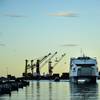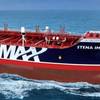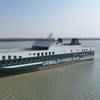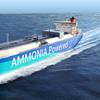Feature: Halimar Shipyard to the Rescue
In the notoriously cyclical and fickle marine business, it is not surprising that occasionally an owner winds up with unfinished hulls and has to move them to another shipyard for completion. A recent example of this is a contract for five utility boats and one 145-ft. supply boat for use in the Gulf of Mexico.
But as they say one man's nightmare is another man's dream. All of the boats had finished hulls, so they could be towed to another shipyard for completion without expensive ground transportation. The owner also had some machinery and parts that he furnished and that was also sent with the hulls in the last quarter of 2002.
At about the same time, shipyard management pro Bill Hidalgo, Sr. was looking to establish a new shipyard after being a senior executive at Conrad Industries for several years. "Every thing just came together at the beginning of last year," Hidalgo reported and he established Halimar Shipyard LLC on January 1, 2003. The yard is on the ICWW off Railroad Avenue in Morgan City, La. Another shipyard building commercial vessels most recently occupied the location. The yard had been virtually closed with the normal deterioration that happens with any shipyard facility that is not fully operating.
"We got the contract to finish the oil field vessels and that was helpful to jump-start the shipyard," Hidalgo said. "Our plans all along called for us to add two 20-ton overhead cranes to our facility and four five ton hoists," said Hidalgo. "We also completely renovated the office area on the second floor of the building as well as the first floor reception area," Hidalgo added.
The contract has gone smoothly. Two of the 126-ft. vessels have been delivered and the third left the shipyard in mid-February. The 145-ft. supply boat is basically just a hull at this time, but Hidalgo thinks the vessel will be completed by summer. Since this contract was to complete vessels that were designed to be sister ships, it was important to Halimar to be sure there we no differences between the boats he was completing and the two vessels the original shipyard had delivered.
"In some cases we got material from the old shipyard that had been purchased for the vessels we finished," Hidalgo said, "but often we had to find the identical gear on the open market and that was sometimes a challenge," Hidalgo added. In the end Hidalgo feels that the vessels he is finishing are as nearly identical to those built by the original shipyard as possible. "Crews from our three boats can easily interchange with the original boats delivered by the first shipyard with no problem," Hidalgo said. The 126-ft. utility vessels and the 145-ft. supply boat are unique in that they are designed to be methanol, water and fuel oil carriers with no capacity for liquid mud. "Methanol has become a major commodity for transport to oil rigs to keep the oil product from freezing in deepwater Gulf of Mexico," Hidalgo said Methanol is a volatile alcohol and special precautions have to be made in transporting and off-loading the material. There is a dedicated methanol off-loading station on the starboard side of the vessel about midway down the open deck with a flow meter and quick connect couplings. It is interesting to note that these vessels were designed with methanol in mind. On the 126-ft. vessels, the methanol is stored in one tank flanked on all sides by ballast tanks. The vessels have a distinctive high bow, low wheelhouse, long deck and an Aurora fire monitor mounted in a turret-styled platform above the aft wheelhouse.
The vessels are powered by a pair of Cummins KT-38 MO diesels rated at 800 hp each yielding a speed of 12-knots loaded or unloaded. Twin disc gears and Bird Johnson props complete the drive trains. A pair of Cummins 6BT5.9 diesels driving 50 kW generators generates electrical power. Mounted between the two propulsion engines is a 360 hp Cummins N-14 diesel that drives a SMI bowthruster on one end and the fire pump and the methanol pump on the other end. The vessels can carry 250 tons of material on her open deck and in below deck tanks. Below deck tanks are arranged with four fuel oil tanks located from just aft of the forepeak ballast tank to almost amidships. Port and starboard cargo water tanks are about amidships forward of the engine room. Flanking the engine room are port and starboard potable water tanks with a 14,300-gallon methanol tank aft of the engine room flanked on all four sides with ballast tanks
The pilothouse is surprisingly roomy for a 126-ft. vessel with large windows both forward and on both sides. An aft-facing station has the visibility and the controls to oversee rear deck operations and the transfer of fluids. Last year Halimar also delivered an 80- by 30-ft. ferry to be used by employees of the National Salt Company Lydia, La. Company employees load their vehicles onto the ferry and travel to an island to mine salt and return to the mainland at the end of the workday. The salt leaves the island via barge. In addition to building the 145-ft. supply boat, Halimar is building a pair of 175-ft. class lift boat hulls. Halimar is building the hull complete with all piping and electrical systems. On deck, Halimar is installing the three leg towers and the bases for two cranes. The hulls are then delivered to Marine Industrial Fabrication, New Iberia, La. for completion. Last year Halimar delivered the first of the two lift boat hulls and the second will ship in the first quarter of 2004. In their second fabrication shed, Halimar is building a pair of 130-foot by 34-foot liquid mud barges. These barges will have two tanks with the capacity for 2,300 lbs. of liquid mud. These are being built for an undisclosed customer.
"We intend to be the low cost, high quality shipyard in this area," Hidalgo said. Halimar has a 36-person construction force. In the office, Hidalgo's son Billy handles the engineering and sales along with his father, Curtis Wiggins, general manager and Jim Mink, safety manager. "In addition there is a secretarial staff of one," Hidalgo added.











